News and views from our community
-

Caring for yourself during the holiday season
The Christmas and New Year holiday season is a time of joy and celebration, but it can also be stressful and overwhelming. It’s important to take care of yourself during this time to ensure that you can enjoy all the fun on offer without feeling burnt out. Here are some handy tips on how to care for yourself at Christmas:Set boundaries: It’s important to know your limits and to communicate these to others. Don’t feel pressured to attend every event or to take on more than you can handle. Learn to say ‘No thank you’ when you need to.Take breaks: Make sure to take some time for yourself. That might be a quiet walk outside, a relaxing bath or a good book. The key is to find something that helps you unwind and recharge.Get enough sleep: A good sleep routine is essential for your physical and mental wellbeing. Try to maintain a regular sleep schedule and aim for at least seven hours of sleep each night.Stay active: Exercise is a great way to reduce stress and boost your mood. Even a short walk around the block can make a big difference. Remember to ‘slip on a shirt, slop on sunscreen and slap on a hat’ to protect yourself from the sun while out and about.Eat well: The Christmas/New Year period is full of tempting treats but it’s important to maintain a balanced diet. Try to eat plenty of fruit and vegetables and limit your intake of sugar and alcohol.Connect with others: Spending time with loved ones can be a source of great comfort and joy during this time of year. Reach out to friends and family and don’t be afraid to ask for help if you need it. Volunteering can also be a wonderful way to boost your mood and spread some holiday cheer.Practice gratitude: Take some time each day to reflect on the things you are grateful for. This can help you stay positive and focused on the good things in your life, instead of worrying about what’s missing.Take care of your mental health: The holiday season can be a challenging time for anyone struggling with mental health issues. Make sure to prioritise your mental wellbeing by seeking support from your GP, therapist or counsellor if needed. You can also connect with support services such as Beyond Blue, SANE Australia or Lifeline.Remember, the holiday season is about more than just gifts and parties. While it’s a great time to connect with others and reflect on the past year, it’s also an important time to take care of yourself.
- 28 Dec 2023
-

Blue Christmas reflection by Acting Head of Spiritual Care, James Lewis
In December 2013, our family packed into the car and drove the caravan across the Nullarbor for a long awaited Long Service Leave holiday. We planned to meet my sister and her family who live in Perth. Mum and Dad and my brother would fly over and join us for a wonderful Christmas gathering. But in July, Mum was diagnosed with a brain tumour. She died two months later. So the LSL changed from an exciting new adventure to a road trip with grief. Christmas was going to be different.In Perth, we gathered with hearts full of love and eyes full of tears. Our dear Mum who had always been our dynamic social engineer was absent. But she was still powering us together! It was so sad, and yet so important to share together. We honoured our love for her in her absence, and in turn she made her ‘presence’ amongst us.With Christmas upon us it is good to acknowledge that this can be a very difficult time for some people. Not everyone looks forward to Christmas: it is a season loaded with all kinds of baggage. It arrives with dreams of holiday excitement, end-of-year relief, family gatherings and parties. For many people it reminds us of those who we most dearly miss; a unique grief and sorrow. We may wish our Mum was still alive to share the time, or a child, or a partner. Equally we may wish to avoid having to spend time with difficult family members or carry the burden of expectations to spend money we don’t have on gifts. Christmas, tragically, is the worst time for domestic violence, homelessness and alcohol abuse.In the northern hemisphere there is a tradition called ‘Blue Christmas’, held on 21 December, their Winter Solstice and longest night. Christian churches hold a service that makes space to honour people who have lost loved ones. The service includes expressions of grief and pain, as well as the opportunity to focus on the promise of hope found in Christ.Acknowledging fragility in this season is important for addressing feelings of shame and isolation. It is helpful to talk about the tension between our hopes and ideals for Christmas – and the reality. A ‘Blue Christmas’ is one way of acknowledging our fragility in the face of difficult times. Sharing fragility builds a sense of common humanity – the gift of community, understanding and hope. Sometimes the heaviest burdens we carry are not imposed by others but by our own unrealistic expectations of ourselves.This Christmas I hope you connect with trustworthy people who are safe, who nourish your life and soul with love, and who remind you of the beauty that emerges in vulnerability. May you have the courage to name what you need to care for yourself and your loved ones.May you find solace and strength in places of beauty, in rituals and spiritual practices that bless your soul and spirit. May you find hope, peace and glimpses of goodness in the aspects of Christmas that feel safe and life-giving.I believe God’s gift in Christmas is the promise of ‘Emmanuel’: God with us in our everyday journey. May there be a sense of the sacredness of companionship in your journey.James LewisActing Head of Spiritual Care.
- 13 Dec 2023
-
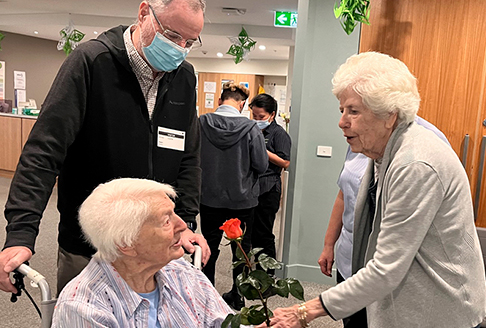
Living Well Together launched at Strathalan Residential Aged Care Community
Living Well Together, our new model of care, has been officially launched at Baptcare’s Strathalan Residential Aged Care community.The launch was a wonderful event, with residents and family members given the opportunity to hear from and meet with Baptcare CEO Geraldine Lannon, Chief Operating Officer Silvia Alberti, Baptcare executive leadership team members and Associate Professor Darshini Ayton from Monash University’s Health and Social Care Unit.Living Well Together (LWT) is also implemented at Brookview community and will be rolled out across all of Baptcare’s residential aged care communities.This approach has been created in consultation with residents, families and Monash University researchers to better meet the needs of all residents who we care for, including those living with cognitive impairment or dementia.At the Strathalan launch the meeting area was festooned with green and white decorations, balloons and posters. All decorations were made by residents, with assistance from staff, exemplifying what LWT, Montessori and person-centred care is all about.Deepti Kaushal, Strathalan’s Residential Care & Services Manager, said the launch was a great event for the whole Strathalan community. “It was spectacular! Residents had a lot of input in decorating the area, and we received a lot of positive feedback from the residents and their families about how LWT has changed their lifestyle and is providing them with an opportunity to do what they were not able to do before.“LWT is about meaningful activities, not just playing games in groups. It’s more personalised and person-centred. We are giving staff more training and education to understand the importance of having engagement with residents rather than just focusing on their task list.“It’s about getting to know the residents more deeply. Staff are receiving training to create genuine opportunities for residents to be involved in more meaningful activities they love to do.”In aged care, models of care define care practices. They guide how aged care services should be delivered, and outline best practice so that residents get the right care at the right time.LWT focuses on what matters to residents, what is important to them, and what gives them meaning and purpose. It also supports staff by defining the tools, resourcing and training they need to best care for all residents.
- 07 Dec 2023
-
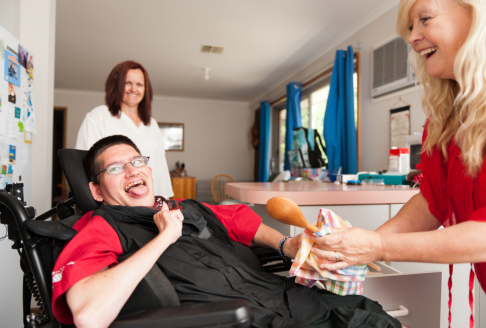
jAre you eligible for a Companion Card?
The Companion Card program is a national program providing eligible people with a disability who require attendant carer support to participate in community events and activities with a complimentary second ticket for their carer.The program is designed to support social inclusion for people with disabilities (including older people living with a disability) and their carers. Each Australian state and territory administers its own Companion Card program and while this article focuses on the Victorian program, we’ve included some useful links to programs in other states for your information.Who is eligible for a Companion Card?To be eligible for the Victorian Companion Card, you must:live in Victoria and be a permanent resident/citizen of Australiahave a significant, permanent disability that requires a lifelong need for a high level of support to participate in venues and events.More information on eligibility is available at the Companion Card website here.How do I apply for a Companion Card?You can apply for a Companion Card using a hard copy form or you can apply online here. You can also call 1800 650 611 and ask for a hard copy form to be sent to you. Applications take a minimum of six weeks to be assessed.Where can I use my Companion Card?The Companion Card can be used at a range of participating venues, including cinemas, theatres, sporting events and more. The card can also be used on all Victorian public transport services. You can find a current list of businesses that participate in the Companion Card program here.How do I use my Companion Card?Each venue that participates in the Companion Card program may have different approaches to booking, for example, via telephone, online or by picking up tickets on the day of the event.If you are booking a ticket via telephone, please advise the Customer Service Representative that you require a Companion Card. They may ask for your name, Companion Card number and expiry date. You may also be asked to present your Companion Card when purchasing a ticket in person.When booking online, some venues provide Companion Card booking information on their websites under headings such as ‘accessibility bookings’.Where can I read more about the Victorian Companion Card program?Click here for more detailed information on eligibility, application process and participating venues. While the information provided in this article is accurate at the time of publication, programs can change, so it’s important to access the latest information on the Companion Card website.I don’t live in Victoria – where can I find information about the Companion Card in my state/territory?If you live outside of Victoria, find links to the Companion Card program in other Australian states and territories here.
- 06 Dec 2023
-
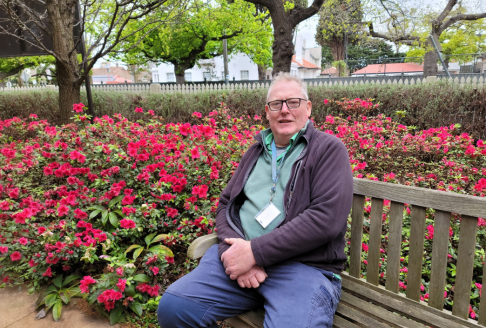
Meet Peter Greene – Head Gardener at our Hedley Sutton community, Camberwell
Walking into the lush gardens of our Hedley Sutton community is one of life’s simple pleasures. It’s early Spring and the first peaks of colourful buds are on display beneath the green velvet canopy of the evergreens.Within the grounds of Hedley Sutton stands Linda Mansion, a splendid example of Boom Style architecture, once home to one of Victoria’s leading retailers, WJ Craig, in the late nineteenth century, before later incarnations as the Presbyterian Babie’s Home (1928-1977) and the Canterbury Family Centre (1977-2000). Generations have enjoyed the space as a place for recreation, introspection, work and social connection.Now home to residents of Baptcare’s retirement living and co-located aged care facility, the gardens are meticulously maintained by Head Gardener, Peter Greene. His devotion to nurturing the smallest flowering buds to the tallest blue gum trees is legendary amongst visitors and residents alike.Read on to learn more about how Peter looks after this enchanting space – and for some handy gardening tips you won’t want to miss.How long have your worked at Baptcare?About six years. I love working here because the people are wonderful, the garden is wonderful! People in our community tell me how much they love the roses and flowers. I feel like they are my friends and I’m blessed to be here.What does a typical day look like for you (if there is such a thing)?There’s no such thing as a typical day!I look forward to my chats with residents and visitors outdoors. I have assistance with the garden from Stewie who comes in a couple times a month for heavy pruning / trimming. So far, all the fertilising is done, mulching is done and the irrigation system is set up – there’s quite a bit of automation in place.How do you plan and design a garden that meets the needs and preferences of all our residents?I know our residents love colour and roses. The design of our garden evolves through all the conversations I have. Some ask me for advice about their pot plants on site. Many of our residents have come from homes with beautiful gardens, so they are delighted to see what we are doing at Hedley Sutton. One lady said to me, ‘This garden reminds me of my childhood home.’ It’s so lovely to see the residents reconnecting with happy memories. I like to make our garden an extension of their own, so that they can feel happy and at home.Sometimes I give the residents a bunch of flowers (most recently, I gave away some gardenias) – I just love seeing the joy it brings to their faces. One of the residents here, Julia, is amazing and delightful. Always full of great suggestions on how I can improve the garden – a lovely lady. She often pulls out the weeds when she sees them!We’ve got vegie pots out the back that our residents love. I’m fixing them up and planting more vegies.With so many beautiful roses – tell us, how do you get rid of aphids?Chilli oil is good, so is soap and water. We don’t use any chemicals on the garden here. Pyretheum is also good – that’s based on natural pyrethrum daisy extract. Aphids don’t like Charlie Carp (liquid fish fertiliser), either so that’s a good one to have on hand.If you keep your garden healthy, you’re less likely to get pests. We see a lot of lady birds here too – they eat the aphids. It’s a healthy ecosystem here at Hedley Sutton.How do you ensure the safety and accessibility of the garden for residents and staff?We are always on watch for trip hazards and are very safety conscious. I make sure hoses aren’t left lying on the paths which would be a trip hazard. We also have to watch for plants encroaching onto paths, like carpet roses, and remain vigilant for any fallen tree branches.We mulch up all the fallen leaves each season and re-use them. We put coffee grains on the garden because the worms love them and snails don’t like coffee. I think that’s why our gardenias are so healthy!We are here on a very cold Spring morning (feels like temperature is 4.2 degrees Celsius). It’s rainy and windy, but in less than a week it’s forecast to be a balmy 26 degrees. What are some of the challenges of maintaining a healthy garden in Melbourne’s variable climate.The main challenge is hot weather – even with our irrigation system. We’ve got to be sensible with our water and plan according to rainfall patterns. In terms of working in the garden, having some flexibility in how we plan our work is essential so that we can tend to the garden as needed.What are some of the materials you use in looking after the garden?I only use Seasol, Charlie Carp, Dynamic Lifter – all organic products. A dose of Seasol every couple of weeks makes the plants much more resistant to the hot weather. A well mulched garden is a good garden. It’s essential to retaining moisture and keeping roots cool in summer. A mulched garden also looks a lot better.Any tips for Spring planting?Prepare your soil and dig in some manure. Preparation of your soil determine the quality of plants. We love dahlias at Hedley Sutton so are planting them and tulips are starting to come up. We have a Café Au Lait Dahlia out the back which has been flowering all Winter, which is unusual, and one to consider.What do you do in your spare time?I like growing vegetables and love bees – I have five hives. It’s wonderful to be able to collect your own honey – I get 50-100kg a year.I volunteer at Reclink which provides sport and recreation programs to disadvantaged Australians. Down at Werribee, we see a lot of people undergoing rehabilitation from drugs and alcohol and we want to be able to help them as they are turning their lives around. We have a community garden, reflexology, tai chi and many sporting programs. People get a cooked lunch every Monday and we often use the vegies we’ve grown in the garden out there. It has a real sense of community.I’ve got a Cavoodle and am babysitting two more at the moment – they are so affectionate!I also like reading non-fiction, especially politics and world events.What’s something a lot of people don’t know about you?I was previously a Registered Nurse. And a prostate cancer survivor – so I know how therapeutic the garden is. I think another reason I love working here is that I really feel the care from everyone around me – residents and staff. It’s a loving community and it’s a real pleasure to be here – I’m blessed to be here. We always have a good laugh together!You’ve just come back from a very well-deserved vacation – what were some of your favourite spots?I really enjoyed Ireland and the greenery there. I found out there’s more than 4,000 castles in Scotland!Buckingham Palace Garden in London was wonderful.In Singapore, we visited the Botanic Gardens – there was a rainforest enclosed in a massive hot house, which was wonderful to experience.What is your motto in life?“Maximum effort with the minimum of fuss.”We can make problems if we want to, or we can choose to find solutions. I’m lucky to be in this Baptcare community where I get to feel the kindness, love and support of our residents every day. And for that I’m truly blessed.Thank you Peter, for your kind devotion to our Hedley Sutton garden and for bringing so much joy to our Hedley Sutton community.If you’d like to learn more about retirement living options at Hedley Sutton, contact us to book a tour here.With preferential consideration for spaces in our residential aged care wing (if your health needs change in future years), Hedley Sutton allows couples with different care and support needs the opportunity to live within the same community.Call us on 13 22 78 to learn more about how we can support you live your best life in our friendly and caring community.
- 20 Nov 2023
-
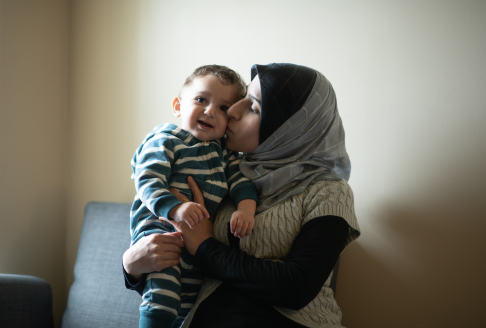
How our Houses of Hope program helped a mother and her young son avoid homelessness
People seeking asylum are some of the most vulnerable people in our society. They may have fled their homeland to escape war, conflict, persecution and/or human rights violations, experiencing great trauma and emotional distress. Often they arrive in countries like Australia with little more than the clothes on their back as they await the outcome of their claim for asylum, which can take years to process.Many people seeking asylum experience profound poverty and without a steady income to pay housing costs (many are prevented from working due to visa restrictions and cannot access Centrelink benefits) and no family or support networks to fall back on, can fall victim to homelessness.Read our story about how Baptcare’s Houses of Hope program stepped in to prevent Kadira and her infant son from falling into homelessness and provided essential support while they found their way to greater independence and freedom.Only months after arriving in Australia and engaging in the legal process to seek asylum, Kadira* and her young child, Saabir* were at imminent risk of becoming homeless after a relationship breakdown with the extended family who had been supporting them.When they first moved into our Houses of Hope program, Kadira explained with support from an interpreter that she had not slept for almost a week. She was concerned for her teenaged children who remained in her home country and her young son who accompanied her to Australia, who had recently not been eating.While she was receiving a small payment from the government, it did not allow her to pay rent and support the needs of herself and her child in private rental, and she knew that this payment was likely to end once her child started school. She was very keen to find employment, but while caring for a young child, finding her feet in a new country and with low English language skills, employment was out of reach.For the weeks and months that followed, our caseworker supported Kadira and Saabir as they settled into their new home and community. This included finding services that could help them to take care of their essential needs, working through the steps to make early childhood services accessible and collaborating with other services to ensure access to health care, recreational activities and an English language program for Kadira.Counselling services were arranged for Kadira to manage the effects of the trauma she had experienced in her home country, and the ongoing anxiety and depression she lives with while separated from her other children. Access to recreational options through referral for gym memberships and events supported by Baptcare volunteers enriched her life with her child. Volunteers drew alongside to give social and parenting support, playing and reading together with Saabir.Since that time, Kadira has worked hard on her English language skills, with a volunteer visiting her at home for lessons, and joined a program supporting women with similar shared experiences. She found casual unskilled work and gained a certificate to allow her to work in aged care. Through the social support networks that she developed over this time, an opportunity arose for her to find work in another part of Melbourne and to find a home where she and her child could settle.While still waiting for determination of her claim for asylum, she moved on from Baptcare expressing profound gratitude for the safety and stability we provided to her and Saabir, at a time they needed it so desperately, and how this had afforded her the time and support to become more independent.If you would like to donate to Baptcare and help support people seeking asylum with safe, affordable housing and associated services, please click here.*Names changed and stock image used for privacy reasons.
- 17 Nov 2023
-
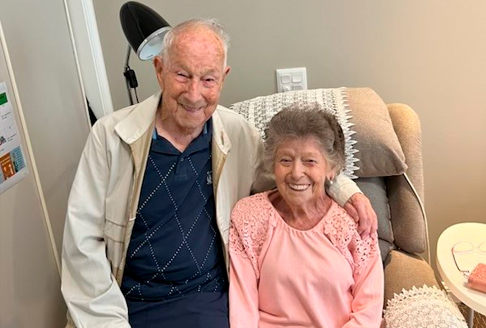
Meet Jack and Gloria
Jack and Gloria were students at the same school until about year eight when Jack left school to work at a grocery shop in Inverloch and Gloria moved to Yallourn North to work in a women's clothing store. Later on, Jack joined the Navy and lost contact with Gloria. It wasn't until years later when Jack moved to Morwell that he would see Gloria around town, but both had married by then and had their own families.
- 16 Nov 2023
-
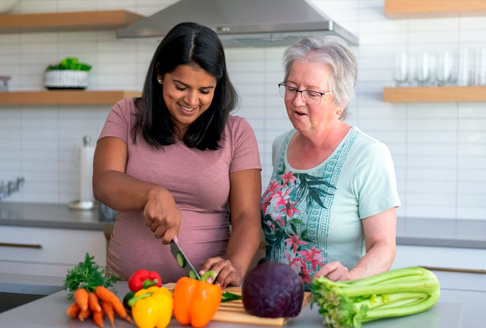
Nutritional information to help you manage your diabetes
Key points: Diabetes is a condition characterised by an inability to control the amount of glucose in the blood, primarily due to issues with insulinThere are two main types of diabetes – Type 1 and Type 2There can be long-term complications if diabetes isn’t managed (for example, cardiovascular disease such as hypertension)Ways to manage living with diabetes include regular exercise, a balanced diet, insulin management and a consultation with diabetes health professionals, maintaining a healthy weight, and regular/appropriate foot and eye careThe Diabetes Plate Method is a simple tool to help plan balanced meals without the need for extensive calculationsWhat is diabetes? When you eat foods that contain carbohydrates, your body digests the carbohydrates into sugar (glucose) that is then used as energy by the cells in your body. Diabetes is a condition that occurs when your body is unable to produce enough insulin.A hormone called insulin is required to transfer glucose from the bloodstream to cells and be converted to energy. For individuals with diabetes, blood glucose levels are frequently above average because either the body does not create insulin (Type 1 diabetes) or cannot make enough insulin (Type 2 diabetes).Type 1 diabetes This form of diabetes is an autoimmune condition caused by the pancreas failing to supply insulin. People who have this condition require regular injections of insulin.Type 2 diabetes In this form of diabetes, the cells that convert glucose to energy in the body become insulin resistant It is diagnosed most commonly in both young and older adults. The risk is increased by family history, aging, prior gestational diabetes, pre-diabetes, being above healthy weight/obese and having an inactive lifestyle.Common symptoms of Type 1 and Type 2 diabetesMany of the symptoms of Type 1 and Type 2 diabetes are similar, however, they present in different ways. People with Type 2 diabetes may not present with symptoms for many years as their symptoms often develop slowly over a long period of time.Both forms of diabetes can share the following short-term symptoms caused by high levels of glucose in the bloodstream:Passing large amounts of urineBeing very thirsty and drinking lots of fluidsBeing tiredBlurred visionExperiencing regular skin infections which can be slow to healUnexpected weight lossLong-term complications of diabetes if not managedIf diabetes is not managed carefully, the following significant long-term complications may arise:Heart and circulation issuesInfectionsKidney diseaseEye problems, leading to being visually impairedNerve damage to the lower limbs and other parts of the bodyHyperglycemia: all adults with untreated diabetes are at risk of developing hyperglycemia which is a disorder of dangerously high blood glucose. Untreated and unaddressed hyperglycemia presents severe health risks which can involve a diabetic coma (ketoacidosis).Ways to manage diabetes Regular physical activityHealthy and balanced dietMaintaining a healthy weightInsulin management: insulin users need to consider the timing, amount, and type of carbohydrate foods they eat, in addition to the timing, amount and type of insulin they takeRegular blood glucose testing will assist you in managing your diabetes, but you should regularly consult with a diabetes health teamHealthy eating tips for people with diabetes Eat consistent meals and healthy snacks spread over the dayEat meals high in fiber, low GI carbohydrate foods i.e., wholegrain breads and cereals, beans, lentils, vegetables and fruitsExamine the amount of fat you consume and reduce saturated fatty foods by opting for lean meats and healthy fatsRemain in your healthy weight rangeTry to balance the amount of food you eat with the amount of energy you burn each dayNutrition Australia offers valuable resources to help you better understand the concept of energy derived from food and how best to maintain a healthy weight. They have also developed a budget-friendly eating guide for tips on promoting a nutritious diet while being mindful of your expenses.The Diabetes Plate Method - an important tool in managing diabetes The Diabetes Plate Method is a simple yet effective way to create healthy meals that can help manage your blood sugar. By using this method, you can create appropriate portioned meals with a healthy balance of vegetables, protein, and carbohydrates. Therefore, you do not need to do any counting, calculating, weighing, or measuring – all you need is a plate! Baker Heart & Diabetes Institute developed a portion plate guide, so you can use this to help you plan, prepare or when ordering a meal.Baptcare’s Allied Health Professionals are here to support youAt Baptcare, we have skilled nursing and allied health professionals, who can support you to maintain your health, manage pain or chronic conditions supporting you to live more safely at home. Our community nursing and allied health services include nurses with diabetic management skills and podiatrists who can support foot care.All services are flexible and can be purchased or you may be eligible through a government-funded Home Care Package. You can read more about how home care works on our website.https://www.baptcare.org.au/why-baptcare/news/how-does-home-care-workWith thanks to Baptcare’s Registered Nurse, Amita Sagar for her specialist input on this blog post.
- 16 Nov 2023
-

How Baptcare supports employees experiencing domestic violence
In Australia almost one in four women over the age of 15 have experienced intimate partner violence (ABS 2017). This statistic is sobering – an indicator of the prevalence of family and domestic violence within the communities Baptcare serves. Unfortunately, this also means it is likely that family violence is the personal, lived experience of our own employees.This article will explore the ways Baptcare is committed to supporting our employees experiencing family and domestic violence, including*:Baptcare’s Family and Domestic Violence PolicySpotlight on Family and Domestic Violence LeaveRespect for confidentialityAdditional employee supports to FDV policy, including Spiritual Care*All of these supports have been communicated to all Baptcare employees recently.Baptcare’s Family and Domestic Violence PolicyBaptcare can make a significant difference to employees affected by family and domestic violence by providing appropriate safety and support measures such as those set out in the Baptcare Family and Domestic Violence (FDV) Policy.Baptcare’s FDV Policy is available on our Baptcare intranet and is motivated by supporting our employees’ safety, making available the time needed for any person experiencing family and domestic violence to seek the expert help and safety they need.The policy covers areas such as relevant supports and training available to staff, the importance of confidentiality in all family and domestic violence matters, workplace safety and security measures, flexible workplace arrangements and family and domestic violence leave (FDV), some of which are discussed below.Family and Domestic Violence Leave (FDV leave)One of the central supports in the FDV Policy is the provision of FDV leave. Baptcare employees (whether full-time, part-time or casual) are entitled to 10 days paid FDV Leave each year, in line with recent legislative changes.Confidentiality assurances – respect for staff privacy and safety is paramount Baptcare acknowledges the very personal and sensitive nature of family domestic violence and the impact on an employee.Baptcare will treat information related to a request for support or for actions related to securing workplace security and safety as confidential and private to the full extent possible in the circumstances. The matter is personal and sensitive, and we understand many employees would not wish other employees to know of their circumstances unless they choose to divulge this information.Subject to the employee’s permission, their manager may be notified of the type of leave their staff member has taken or wishes to take. Otherwise, the People and Culture team will work to ensure the employee is paid appropriately and that their pay slip does not reflect the type of leave taken. Option for staff to request a flexible work arrangementAn employee who is experiencing family domestic violence, or who needs to provide care or support to a member of their household or immediate family because of FDV, may request a change to their work arrangements. Additional employee supports available beyond those provided in the FDV PolicyBaptcare also provides the following:direct, confidential and ongoing connection with a People and Culture representative to employees experiencing family and domestic violenceconnection for employees and their families with employee assistance provider Converge International, including its specialist family violence hotlineaccess to two other employee assistance providers – Karinya (Victoria) and CLS (Tasmania)geographically and circumstance-appropriate referrals including Orange Doors, community legal centres and specialist family violence servicescoaching of people managers around handling disclosure and effectively supporting workers experiencing family and domestic violencespiritual care where appropriateSpiritual Care support At Baptcare, spiritual care is provided by a team of Spiritual Care Coordinators and chaplains. This support is provided to our clients, their families and carers - and also to our employees, should they wish to access it. Where possible, Baptcare hubs also offer a quiet reflection space for staff members experiencing personal difficulties, such as family and domestic violence, to seek respite and support.Extra resources in developmentBaptcare Family Violence SharePoint Resource Site has had a soft launch on our intranet. This resource site has been created to support Baptcare’s workforce for both personal and professional use. This resource will house practice tools, family violence frameworks, support services and other related information and resources. There will also be Family Violence one-page action tip list available to all Baptcare employees.You can read a Faces of Baptcare profile of Lia Porteus and learn about her lived experience of family violence and why she thinks campaigns such as the 16 Days of Activism are so important.
- 15 Nov 2023
